形容词副词讲义(精选.)
高考英语复习形容词和副词知识点讲解讲义(必考点)
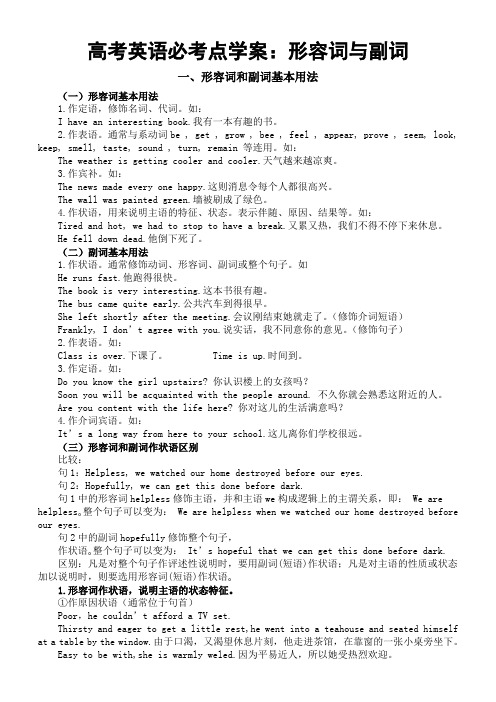
高考英语必考点学案:形容词与副词一、形容词和副词基本用法(一)形容词基本用法1.作定语,修饰名词、代词。
如:I have an interesting book.我有一本有趣的书。
2.作表语。
通常与系动词be , get , grow , bee , feel , appear, prove , seem, look, keep, smell, taste, sound , turn, remain 等连用。
如:The weather is getting cooler and cooler.天气越来越凉爽。
3.作宾补。
如:The news made every one happy.这则消息令每个人都很高兴。
The wall was painted green.墙被刷成了绿色。
4.作状语,用来说明主语的特征、状态。
表示伴随、原因、结果等。
如:Tired and hot, we had to stop to have a break.又累又热,我们不得不停下来休息。
He fell down dead.他倒下死了。
(二)副词基本用法1.作状语。
通常修饰动词、形容词、副词或整个句子。
如He runs fast.他跑得很快。
The book is very interesting.这本书很有趣。
The bus came quite early.公共汽车到得很早。
She left shortly after the meeting.会议刚结束她就走了。
(修饰介词短语)Frankly, I don’t agree with you.说实话,我不同意你的意见。
(修饰句子)2.作表语。
如:Class is over.下课了。
Time is up.时间到。
3.作定语。
如:Do you know the girl upstairs? 你认识楼上的女孩吗?Soon you will be acquainted with the people around. 不久你就会熟悉这附近的人。
形容词与副词 --讲义

形容词与副词用来描述事物大小,形状,颜色等具体特征的词叫做形容词。
1作定语修饰名词和不定代词形容词修饰名词作前置定语。
放在被修饰词之后,作后置定语。
1)形容词修饰something ,anything等复合不定代词时后置。
2,the+形容词,表示一类人注意;作主语谓语动词用复数4形容词的比较等级原级1.形容词的原级比较句型有:1) as +形容词的原级+as.其否定式为:not so (as)+形容词原级+as。
2)当我们要表示A是B的几倍或几分之几时,我们用的句型:A +几倍或几分之几as +形容词的原级+as +B。
This room is three times as big as that one.3) as many+可数名词/much+不可数名词+as.He earns as much money as his mother does.比较级和最高级大多数形容词的比较级和最高级是采用在词尾加-er和-est的形式,或在单词前加more和most构成。
3)特殊形式的比较级和最高级:英文中有些形容词的比较级和最高级的变化是不规则的。
如:原级比较级最高级good/well better bestbad/ill worse worstfar farther/further farthest/furthestold older/elder oldest/oldestlittle less leastmany/much more mostlate later/latter latest/last※对于上述形容词中有两种不同形式的特殊比较级和最高级用法做一下说明:a) farther/farthest和further/furthest的比较四个词都可以表示实际的距离。
但是further/furthest可用于指抽象意义,表示―进一步的,更深入的‖。
further study进一步研究b) older/oldest和elder/eldest的比较elder/eldest主要用来表示家庭成员之间的长幼关系my elder brother我的哥哥his eldest son他的长子在有than的比较句中一般不用elder,要用older.I am two years older than Tom.我比汤姆大两岁。
形容词副词讲义及练习

专题五形容词及副词知识摘要用法形容词的功能:定语、表语或宾语补足语用法副词功能:定语、表语或宾语补足语形容词和副词形容词与副词的转化形容词、副词的比较级与最高级的变化规律原级的用法形容词、副词的比较等级比较级的用法最高级的用法考点梳理考点一、形容词的用法及位置1、形容词的用法形容词是用来描写或修饰名词(或代词)的一类词。
在句子可做定语、表语或宾语补足语等。
Peter is tall. 彼得个子高。
(做表语)We must keep our room clean. 我们必修保持我们的房间干净。
(做宾补) 2.、形容词的位置(1) 形容词作定语时一般放在它所修饰的词的前面。
I think it’s an interesting book. 我认为它是一本有趣的书。
(2) 形容词修饰复合不定代词时放在复合不定代词之后。
She has something important to tell us. 她有重要的时期要告诉我们。
【知识拓展】2、以-ly结尾的形容词:friendly 友好的lonely 孤独的lovely 可爱的likely 可能的daily 日常的lively 有生气的考点二、副词的用法及位置1、副词的功能及用法副词是用来修饰动词、形容词、其它副词以及全句的词,在句子中可作状语、表语、定语和宾语补足语。
The students are working hard in the school. 学生们正在学校努力学校。
I’m afraid I must be off now. 恐怕我现在得走了。
2、副词的位置(1)修饰动词,多数位于动词之后,及动词的宾语之后。
She speaks English well. 她英语说得好。
(2)频度副词(always, never, often等)通常放在行为动词之前,情态动词、be动词、助动词之后。
但是sometimes 位置较灵活,他还可以放在句中的开头或结尾。
形容词、副词讲义

eg. Bajie is a lazy pig. He said something exciting. The girl is cute. 一. 形容词(表示性质或特征) (一)形容词的基本用法:修饰名词或代词,作定语或表语 1. 形容词+名词 eg. Shenyang is a beautiful city. 2. 系动词+形容词 eg. Miss Yu looks young. 3. 复合不定代词+形容词 eg. She often reads something interesting. 4. 形容词+ enough eg. Is it warm enough for you? 5. 多个形容词的顺序:好美小高状其新,彩色国料加用途 两张小圆桌 一件又脏又旧的棕色衬衫 two small round tables a dirty old brown shirt 一张新的漂亮的黑色中式木制大圆桌 (二)形容词的位置 exercise 1. It is very cold. Please keep the door and windows ________. A. open B. closed C. close D. opened 2. Is this room ______ the meeting? A. big enough to have B. enough big to have C. big enough having D. enough big having 3. Mary ’s mother bought a ________ coat for her yesterday. A. new blue silk B. blue new silk C. new silk blue D. blue silk new(三)形容词的构成1. 名词变形容词2. 复合形容词由“数词+名词”构成的复合形容词中,名词要用单数形式,且数词和名词之间要用连字符。
初中英语形容词副词讲义

第六讲形容词和副词教学目标1.掌握形容词和副词的基本用法2. 学会形容词和副词的比较等级3. 熟记形容词和副词的变化规则4. 利用形容词和副词的相关知识答题。
课程类型新授课课程时长 1.5h重点句子1.The Spring Festival is the most important traditional festival in China春节是中国最重要的传统节日。
2.Thanks to the government,our hometown has developed rapidly in recent years.The living conditions are much better and more comfortable.多亏了政府,我们的家乡近几年发展迅速,生活条件变得更好,更加舒适课堂导入Heavy Heavier The heaviestThe pig is heavy .The lion is heavier than the pig.The elephant is the heaviest of the three.考点一形容词和副词的基本用法[拓展] 形容词的其他用法(1)“the+形容词”表示一类人或物,如:the old 老人。
(2)形容词常用句式:①“It's+adj.+for+sb.+to do sth.” 表示“做某事对某人来说是……的”。
在这一句型中,常用描述事物性质的形容词,如: easy, difficult, important, dangerous等。
例:It is important for us ________ (work) hard.①“It's+adj.+of+sb.+to do sth.” 表示“某人做某事是……的”。
在这一句型中,常用描述行为者的性格、品质的形容词.如: good, kind, nice, polite, clever, foolish, lazy, careful等。
高考英语复习核心形容词副词汇总讲义(生气+困惑+平静+特别)

高考英语核心形容词和副词一、生气1.angry /ˈæŋɡri/ adj.生气的【近】annoyed adj.恼怒的【反】delighted adj.高兴的;令人愉快的get angry 生气;发脾气be angry at/with sb./sth.生……的气[e.g.] I was really angry with her.我很生她的气。
[e.g.]There is no need being angry with others about the mistakes they unconsciously make.{应用文—建议信}没必要为别人无心犯下的错和他们生气。
make sb.angry 使某人生气[e.g.] It made me really angry.我很生气。
2.mad /mæd/ adj.生气的;发疯的like mad 疯狂地;极快地go mad 疯了be mad at/with sb.对某人生气[e.g.]You are not supposed to be mad at your sister.你不该对你妹妹生气。
be mad for sb./sth.为某人/某物着迷[e.g.]Tom is mad for basketball.汤姆对篮球十分着迷。
make/drive sb.mad 使人恼火[e.g.]Her silly questions drives me mad.她愚蠢的提问使我恼火。
【扩展】furious /ˈfjʊəriəs/ adj.生气的二、困惑1.puzzled /ˈpʌz(ə)ld/ adj.感到困惑的puzzled look 迷惑的表情be puzzled about/at/as to…对……感到困惑[e.g.]I have been puzzled as to why British people like to talk about weather.{应用文—书信}我一直很困惑为什么英国人喜欢谈论天气。
初中英语形容词和副词讲义

讲义3 :形容词一、形容词的定义:表示人或事物的属性,特征或状态的词叫形容词(Adjective).形容词修饰名词,它的基本用法就是为名词提供更多的信息,它分为性质形容词和叙述形容词两类.二、形容词的位置1、单个形容词修饰名词时,一般要放在名词的前面,做定语。
它们的前面常常带有冠词、形容词性物主代词、指示代词、数词等。
例如:a red flower一朵红花 this interesting story这个有趣的故事six blind men 六个盲人 my own house我自己的房子形容词修饰something, anything, nothing, everything等不定代词时,形容词放在名词后面。
例如:I have something important to tell you.Is there anything interesting in the film.三、形容词和副词的等级变化大多数形容词和副词有三个级:原级(即原形)、比较级和最高级。
1 一般在词末尾加er变比较级,加est变最高级。
strong —stronger -strongest small--smaller--smallest hard→harder →hardest fast→faster →fastest2 如果以e结尾,只加r 或st。
nice--nicer--nicest fine--finer--finest3 以重读闭音节,末尾只有一个辅音字母,须先双写这个辅音字母,再加er或est。
sad--sadder-- saddest big--bigger--biggest hot--hotter --hottest4 以辅音字母加y结尾的词,把y变成i,再加er或est。
angry--angrier-angriest early→earlier →earliest hungry-hungrier-hungriest5、但是,开放类副词即形容词加ly结尾变成的副词加more或most.如quickly →more quickly →most quickly quietly →more quietly →most quietlyslowly—more slowly—most slowly[注]:early中的ly不是后缀,故把y变i再加er和est6、大部分双音节和所有多音节词都在其前面加more变比较级,加most变最高级different -more different -most differentbeautiful--more beautiful--the most beautifulexpensive--more expensive--the most expensive但是,以形容前缀un结尾的三音节形容词不适合上述情况,如unhappy,untidy,我们可以说:unhappier→u nhappiest,形容词比较级和最高级的不规则变化四.形容词副词的用法1."the+形容词",表示一类人或事物,相当于名词,用作主语及宾语The old often think of old things.2 "The+形容词比较级..., the+形容词比较级..."表示 " 越... 就越..."。
英语形副词知识点讲义
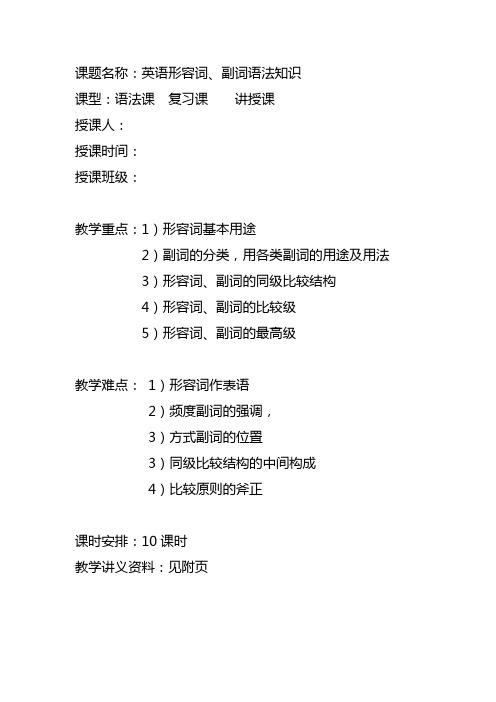
课题名称:英语形容词、副词语法知识课型:语法课复习课讲授课授课人:授课时间:授课班级:教学重点:1)形容词基本用途2)副词的分类,用各类副词的用途及用法3)形容词、副词的同级比较结构4)形容词、副词的比较级5)形容词、副词的最高级教学难点:1)形容词作表语2)频度副词的强调,3)方式副词的位置3)同级比较结构的中间构成4)比较原则的斧正课时安排:10课时教学讲义资料:见附页词类语法之形容词、副词语法形容词, 副词在英语中主要为修饰用法词类, 在句子中一般不作句子的主体成分. 形容词, 副词的掌握可以分两步进行, 第一步是掌握形容词, 副词的基础; 第二步是掌握形容词, 副词的比较等级用法.形容词基础知识要点: 形容词是表示事物性质的一种词, 在英语中形容词的用法有以下几种, 1) 作定语, 修饰名词或代词. 如a beautiful picture, dirty water, something important. 其中的要点有, 作名词定语时一般为前置性定语, 作复合式不定代词的定语时, 应该为后置性定语. 2) 作表语, 表语是英语中的一种特殊句子成分, 表语为主系表结构中的一种主体句子成分. 表语包括, be动词表语, 纯系动词表语, 半系动词表语. be动词之后的表语成分, 除用形容词充当以外, 还可以为名词短语, 介词短语, 副词短语, 数词短语, 以及非谓语动词, 表语从句等较为复杂的短语结构类型, 但纯系动词或半系动词的表语一般固定的以形容词充当, 因此, 一般认定谓语动词为纯系动词或半系动词后,其后的用词相当简单. 常用的纯系动词有look看起来, sound听起来, taste尝起来, feel 觉得或摸起来, smell闻起来, 嗅起来, keep保持, last持续, stay保持, seem好像, 似乎. 半系动词主要有: go, get, come, become, change, run等表示变得的动词. 纯系动词或半系动词多数由及物动词或不及物动词通过转变词义而来, 因此, 判断谓语动词是否为系动词词义是判断的直接依据. 此外, 谓语动词判断为系动词后, 其后直接加形容词是解题和写作的关键. 3)作宾语补足语.形容词作宾语补足语时对谓语动词动词有所要求, 职高对口高考中要注意make后加形容词作宾语补足语,有以下几种结构make sb +形容词, 表示让某人变得怎样或让某人感到怎样, make sth +形容词,表示让某事物变得怎样. 4)作伴随状语, 形容词在句末作独立的伴随状语, 说明动作产生时的状态,相当于句末用副词作方式状语. 如He rushed into the classroom, tired and angry.=He rushed into the classroom tiredly and angrily. 他又气又累地冲进了教室. 5)多个形容词作前置性定语同时修饰一个名词中心词的位置,多个形容词同时修饰一个中心名词作前置性定语时多以头发修饰结构类推或以人的修饰结构类推。
第05讲形容词和副词(精讲)2024年高考英语高频考点题型归纳与方法总结(新高考通用)原卷版
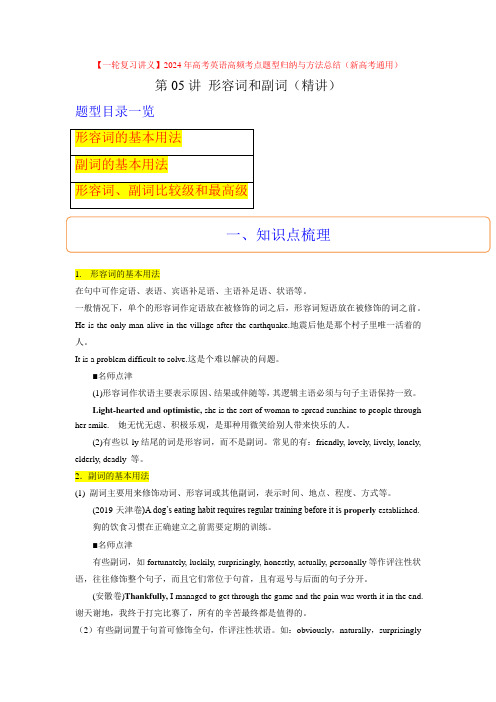
【一轮复习讲义】2024年高考英语高频考点题型归纳与方法总结(新高考通用)第05讲形容词和副词(精讲)题型目录一览1.形容词的基本用法在句中可作定语、表语、宾语补足语、主语补足语、状语等。
一般情况下,单个的形容词作定语放在被修饰的词之后,形容词短语放在被修饰的词之前。
He is the only man alive in the village after the earthquake.地震后他是那个村子里唯一活着的人。
It is a problem difficult to solve.这是个难以解决的问题。
■名师点津(1)形容词作状语主要表示原因、结果或伴随等,其逻辑主语必须与句子主语保持一致。
Light-hearted and optimistic, she is the sort of woman to spread sunshine to people through her smile.她无忧无虑、积极乐观,是那种用微笑给别人带来快乐的人。
(2)有些以-ly结尾的词是形容词,而不是副词。
常见的有:friendly, lovely, lively, lonely, elderly, deadly 等。
2.副词的基本用法(1) 副词主要用来修饰动词、形容词或其他副词,表示时间、地点、程度、方式等。
(2019·天津卷)A dog’s eating habit requires regular training before it is properly established.狗的饮食习惯在正确建立之前需要定期的训练。
■名师点津有些副词,如fortunately, luckily, surprisingly, honestly, actually, personally等作评注性状语,往往修饰整个句子,而且它们常位于句首,且有逗号与后面的句子分开。
(安徽卷)Thankfully, I managed to get through the game and the pain was worth it in the end.谢天谢地,我终于打完比赛了,所有的辛苦最终都是值得的。
形容词副词讲义
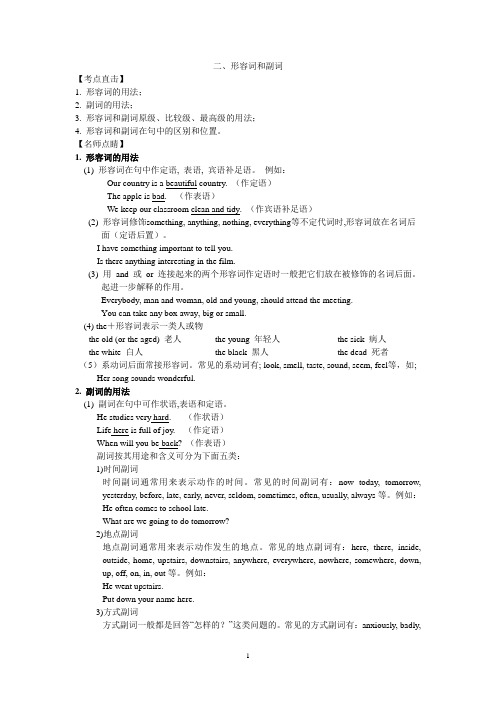
二、形容词和副词【考点直击】1. 形容词的用法;2. 副词的用法;3. 形容词和副词原级、比较级、最高级的用法;4. 形容词和副词在句中的区别和位置。
【名师点睛】1. 形容词的用法(1) 形容词在句中作定语, 表语, 宾语补足语。
例如:Our country is a beautiful country. (作定语)The apple is bad. (作表语)We keep our classroom clean and tidy. (作宾语补足语)(2) 形容词修饰something, anything, nothing, everything等不定代词时,形容词放在名词后面(定语后置)。
I have something important to tell you.Is there anything interesting in the film.(3) 用and 或or 连接起来的两个形容词作定语时一般把它们放在被修饰的名词后面。
起进一步解释的作用。
Everybody, man and woman, old and young, should attend the meeting.You can take any box away, big or small.(4) the+形容词表示一类人或物the old (or the aged) 老人the young 年轻人the sick 病人the white 白人the black 黑人the dead 死者(5)系动词后面常接形容词。
常见的系动词有; look, smell, taste, sound, seem, feel等,如;Her song sounds wonderful.2. 副词的用法(1) 副词在句中可作状语,表语和定语。
He studies very hard. (作状语)Life here is full of joy. (作定语)When will you be back? (作表语)副词按其用途和含义可分为下面五类:1)时间副词时间副词通常用来表示动作的时间。
形容词、副词的比较级和最高级讲义

一. 形容词、副词的比较级和最高级一.形容词、副词的级:原级,比较级,最高级二.形容词、副词三个级的用法:1.原级比较,和……一样as +原级+as (否定:not so/as …as)eg. They run quite fast. 他们跑得相当快。
Jimmy is as tall as his father. 吉姆和他的爸爸一样高。
He studies as hard as his brother. 他和他哥哥学习一样努力。
2.二者比较时(用比较级),比较级+thaneg. Helen is taller than me/I (am). 海伦比我高。
She runs faster than he (does). 她跑得比他快。
3.the+最高级+(名词)+范围,表示在……中是最……的eg. The dress is the largest in the shop. 这条裙子是店里最大的。
He runs (the) fastest in our class.■不规则变化:两多两好三不好,一老一远加一少(最高级前要用the,副词最高级前面可省略)四.比较级的其他句型结构1. 表示两者之间的选择,可使用“Which/Who+ 谓语动词+比较级, …or …?●Which one is ______________, this one or that one?A. goodB. badC. bestD. worseeg. Which T-shirt is nicer, this one or that one?2. 比较级+and+比较级或more and more +原级,表示越来越……eg. It becomes warmer and warmer when spring comes.It is getting cooler and cooler.Our school is becoming more and more beautiful.● The weather is becoming ______________.A. hotter and hotterB. more hot and hotC. hoter and hoterD. more and more hot● I like Meishan ___________ because it is becoming __________.A. well; beautifulB. better; more and more beautifulC. well; more and more beautifulD. better; beautiful and beautiful●—I talked with my little uncle on the computer last night.--The internet makes the world _________________.A. small and smallB. smaller and smallerC. small and smallerD. smaller and small3. the+比较级,the+比较级,越……,越……eg. The more we get, the happier we feel.The sooner, the better.The harder you work, the better grades you’ll get.● ___________ you’re, __________ mistakes you’ll make.A. The careful, the lessB. The more careful, the lessC. The more carefully, the fewerD. The more careful, the fewer●–The more you practice, ___________ your English will be.-- I agree. Practice makes perfect.A. the betterB. the worseC. moreD. less4.the+比较级+of,表示两者之间较……的一个eg. Nancy and Lucy are twins. In some way they look the same, but Nancy is the taller of the two.5. 比较级+than+ any+ other+名词(单数),表示比其他任何的……都……(比较级的形式表示最高级的含义)eg. He is taller than any other student in his class.=He is the tallest student in his class.他比他班上的任何一个学生都高。
形容词和副词讲义
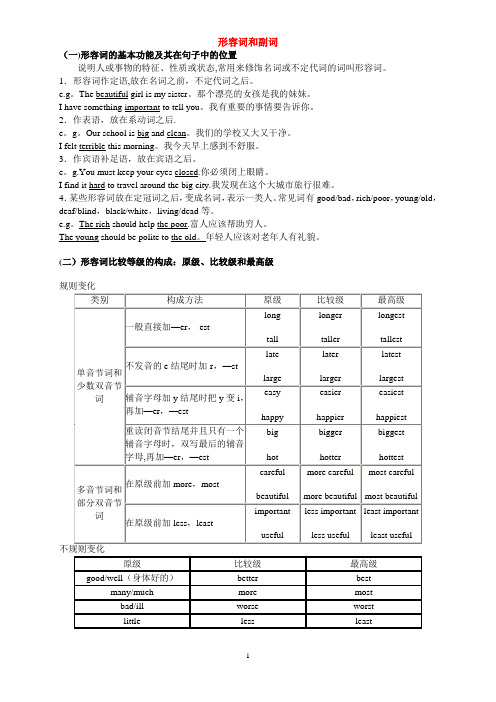
形容词和副词(一)形容词的基本功能及其在句子中的位置说明人或事物的特征、性质或状态,常用来修饰名词或不定代词的词叫形容词。
1.形容词作定语,放在名词之前,不定代词之后。
e.g。
The beautiful girl is my sister。
那个漂亮的女孩是我的妹妹。
I have something important to tell you。
我有重要的事情要告诉你。
2.作表语,放在系动词之后.e。
g。
Our school is big and clean。
我们的学校又大又干净。
I felt terrible this morning。
我今天早上感到不舒服。
3.作宾语补足语,放在宾语之后。
e。
g.You must keep your eyes closed.你必须闭上眼睛。
I find it hard to travel around the big city.我发现在这个大城市旅行很难。
4.某些形容词放在定冠词之后,变成名词,表示一类人。
常见词有good/bad,rich/poor,young/old,deaf/blind,black/white,living/dead等。
e.g。
The rich should help the poor.富人应该帮助穷人。
The young should be polite to the old。
年轻人应该对老年人有礼貌。
(二)形容词比较等级的构成:原级、比较级和最高级规则变化不规则变化(三)形容词原级用法1.说明人或事物自身的特征、性质和状态时用形容词原级.The boy is too young。
这男孩太小了Math is very difficult.数学很难。
3.表示A与B在某一方面程度相同或不同时用形容词原级。
(1)肯定句中的结构:“A…+as+形容词原级+as+B”e。
g.English is as interesting as Chinese。
英语和语文一样有趣.Xiao Ming is as tall as Jim。
形容词副词讲义

形容词副词定义:中文的意思是“……的”的词是形容词,用来修饰名词;中文意思是“……地”的词是副词,用来修饰动词、形容词或副词形容词与副词在句中的位置形容词形容词的比较级在句中的位置名词所有格 副词的比较级形容词副词的转换考点清单练习:练习① It is a ____(sun) day. ② It is a _____(rain) day.③ I think you are a _____(luck) girl. ④ The teacher said he had _____to tell us.A. anything importantB. important anythingC. something importantD. important something⑤ Look !Jack is ____(excite,excited) . ⑥ I feel ____(happy) every day.⑦ The baby is sleeping ,please keep______(quiet,quietly)考点二:形容词的比较级(1)在形容词词尾加上“er”“est”构成比较级、最高级:bright(明亮的)—brighter—brightest broad(广阔的)—broader—broadest cheap(便宜的)—cheaper—cheapest clean(干净的)—cleaner—cleanest clever(聪明的)—cleverer—cleverest cold(寒冷的)—colder—coldestcool(凉的)—cooler—coolest dark(黑暗的)—darker—darkest dear(贵的)—dearer—dearest deep(深的)—deeper—deepestfast(迅速的)—faster—fastest few(少的)—fewer—fewestgreat(伟大的)—greater—greatest hard(困难的,硬的)—harder—hardest high(高的)—higher—highest kind(善良的)—kinder—kindestlight(轻的)—lighter—lightest long(长的)—longer—longestloud(响亮的)—louder—loudest low(低的)—lower—lowestnear(近的)—nearer—nearest new(新的)—newer—newestpoor(穷的)—poorer—poorest quick(快的)—quicker—quickest quiet(安静的)—quieter—quietest rich(富裕的)—richer—richestshort(短的)—shorter—shortest slow(慢的)—slower—slowestsmall(小的)—smaller—smallest smart(聪明的)—smarter—smartest soft(柔软的)—softer—softest strong(强壮的)—stronger—strongest sweet(甜的)—sweeter—sweetest tall(高的)-taller-tallestthick(厚的)—thicker—thickest warm(温暖的)—warmer—warmest weak(弱的)—weaker—weakest young(年轻的)—younger—youngest (2).双写最后一个字母,再加上“er”“est”构成比较级、最高级:big(大的)—bigger—biggest fat(胖的)—fatter—fattesthot(热的)—hotter—hottest red(红的)—redder—reddestsad(伤心的)—sadder—saddest thin(瘦的)—thinner—thinnestwet(湿的)—wetter—wettest mad(疯的)—madder—maddest(3).以不发音的字母e结尾的形容词,加上“r”“st”构成比较级、最高级:able(能干的)—abler—ablest brave(勇敢的)—braver—bravest close(接近的)—closer—closest fine(好的,完美的)—finer—finest large(巨大的)—larger—largest late(迟的)—later—latestnice(好的)—nicer—nicest ripe(成熟的)—riper—ripestrude(粗鲁的)—ruder—rudest safe(安全的)—safer—safeststrange(奇怪的)—stranger—strangest wide(宽广的)—wider—widestwise(睿智的,聪明的)—wiser—wisest white(白的)—whiter—whitest(4).以字母y结尾的形容词,把y改为i,再加上“er”“est”构成比较级、最高级:busy(忙碌的)—busier—busiest dirty(脏的)—dirtier—dirtiestdry(干燥的)—drier—driest early(早的)—earlier—earliesteasy(容易的)—easier—easiest friendly(友好的)—friendlier—friendliest funny(好玩的)—funnier—funniest happy(开心的)—happier—happiest healthy(健康的)—healthier—healthiest heavy(重的)—heavier—heaviesthungry(饿的)—hungrier—hungriest lazy(懒惰的)—lazier—laziestlucky(幸运的)—luckier—luckiest naughty(调皮的)—naughtier—naughtiest noisy(嘈杂的)—noisier—noisiest pretty(美丽的)—prettier—prettiestsilly(傻的)—sillier—silliest spicy(辣的)—spicier—spiciestthirsty(渴的)—thirstier—thirstiest ugly(丑的)—uglier—ugliest(5).双音节、多音节形容词,在单词前面加上“more”“most”构成比较级、最高级:afraid(害怕的)—more afraid—most afraidbeautiful(美丽的)—more beautiful—most beautifulcareful(仔细的)—more careful—most carefulcheerful(开心的)—more cheerful—most cheerfulcrowded(拥挤的)—more crowded—most crowdeddangerous(危险的)—more dangerous—most dangerousdelicious(美味的)—more delicious—most deliciousdifficult(困难的)—more difficult—most difficultexciting(令人兴奋的)—more exciting—most excitingexpensive(昂贵的)—more expensive—most expensivefamous(著名的)—more famous—most famousfrightened(受惊的)—more frightened—most frightenedfrightening(令人害怕的)—more frightening—most frighteninghard-working(勤奋的)—more hard-working—most hard-workinghelpful(有帮助的)—more helpful—most helpfulhonest(诚实的)—more honest—most honestimportant(重要的)—more important—most importantinteresting(有趣的)—more interesting—most interestingpolite(有礼貌的)—more polite—most politeterrible(可怕的)—more terrible—most terribletired(累的)—more tired—most tired(6).不规则变化的形容词:bad(坏的)—worse—worst far(远的)—farther—farthest (far—further—furthest) good(好的)—better—best ill(病的)—worse—worstlittle(少的)—less—least many(多的)—more—most much(多的)—more—most old(年老的)—older—oldest ( old—elder—eldest) well(好的,身体好的)—better—best练习1. Is your friend ____ (young) than you ?2. Shanghai is one of ______ (big) cities in the world.3. Do you think English is _____important than maths。
- 1、下载文档前请自行甄别文档内容的完整性,平台不提供额外的编辑、内容补充、找答案等附加服务。
- 2、"仅部分预览"的文档,不可在线预览部分如存在完整性等问题,可反馈申请退款(可完整预览的文档不适用该条件!)。
- 3、如文档侵犯您的权益,请联系客服反馈,我们会尽快为您处理(人工客服工作时间:9:00-18:30)。
形容词副词定义:中文的意思是“……的”的词是形容词,用来修饰名词;中文意思是“……地”的词是副词,用来修饰动词、形容词或副词形容词与副词在句中的位置形容词形容词的比较级在句中的位置名词所有格副词的比较级形容词副词的转换考点清单练习:练习①It is a ____(sun) day.②It is a _____(rain) day.③I think you are a _____(luck) girl.④The teacher said he had _____to tell us.A. anything importantB. important anythingC. something importantD. important something⑤Look !Jack is ____(excite,excited) .⑥I feel ____(happy) every day.⑦The baby is sleeping ,please keep______(quiet,quietly)考点二:形容词的比较级(1)在形容词词尾加上“er”“est”构成比较级、最高级:bright(明亮的)—brighter—brightest broad(广阔的)—broader—broadest cheap(便宜的)—cheaper—cheapest clean(干净的)—cleaner—cleanest clever(聪明的)—cleverer—cleverest cold(寒冷的)—colder—coldestcool(凉的)—cooler—coolest dark(黑暗的)—darker—darkest dear(贵的)—dearer—dearest deep(深的)—deeper—deepestfast(迅速的)—faster—fastest few(少的)—fewer—fewestgreat(伟大的)—greater—greatest hard(困难的,硬的)—harder—hardest high(高的)—higher—highest kind(善良的)—kinder—kindestlight(轻的)—lighter—lightest long(长的)—longer—longestloud(响亮的)—louder—loudest low(低的)—lower—lowestnear(近的)—nearer—nearest new(新的)—newer—newestpoor(穷的)—poorer—poorest quick(快的)—quicker—quickest quiet(安静的)—quieter—quietest rich(富裕的)—richer—richestshort(短的)—shorter—shortest slow(慢的)—slower—slowestsmall(小的)—smaller—smallest smart(聪明的)—smarter—smartest soft(柔软的)—softer—softest strong(强壮的)—stronger—strongest sweet(甜的)—sweeter—sweetest tall(高的)-taller-tallestthick(厚的)—thicker—thickest warm(温暖的)—warmer—warmest weak(弱的)—weaker—weakest young(年轻的)—younger—youngest (2).双写最后一个字母,再加上“er”“est”构成比较级、最高级:big(大的)—bigger—biggest fat(胖的)—fatter—fattesthot(热的)—hotter—hottest red(红的)—redder—reddestsad(伤心的)—sadder—saddest thin(瘦的)—thinner—thinnestwet(湿的)—wetter—wettest mad(疯的)—madder—maddest(3).以不发音的字母e结尾的形容词,加上“r”“st”构成比较级、最高级:able(能干的)—abler—ablest brave(勇敢的)—braver—bravest close(接近的)—closer—closest fine(好的,完美的)—finer—finest large(巨大的)—larger—largest late(迟的)—later—latestnice(好的)—nicer—nicest ripe(成熟的)—riper—ripestrude(粗鲁的)—ruder—rudest safe(安全的)—safer—safeststrange(奇怪的)—stranger—strangest wide(宽广的)—wider—widestwise(睿智的,聪明的)—wiser—wisest white(白的)—whiter—whitest(4).以字母y结尾的形容词,把y改为i,再加上“er”“est”构成比较级、最高级:busy(忙碌的)—busier—busiest dirty(脏的)—dirtier—dirtiestdry(干燥的)—drier—driest early(早的)—earlier—earliesteasy(容易的)—easier—easiest friendly(友好的)—friendlier—friendliest funny(好玩的)—funnier—funniest happy(开心的)—happier—happiest healthy(健康的)—healthier—healthiest heavy(重的)—heavier—heaviesthungry(饿的)—hungrier—hungriest lazy(懒惰的)—lazier—laziestlucky(幸运的)—luckier—luckiest naughty(调皮的)—naughtier—naughtiest noisy(嘈杂的)—noisier—noisiest pretty(美丽的)—prettier—prettiestsilly(傻的)—sillier—silliest spicy(辣的)—spicier—spiciestthirsty(渴的)—thirstier—thirstiest ugly(丑的)—uglier—ugliest(5).双音节、多音节形容词,在单词前面加上“more”“most”构成比较级、最高级:afraid(害怕的)—more afraid—most afraidbeautiful(美丽的)—more beautiful—most beautifulcareful(仔细的)—more careful—most carefulcheerful(开心的)—more cheerful—most cheerfulcrowded(拥挤的)—more crowded—most crowdeddangerous(危险的)—more dangerous—most dangerousdelicious(美味的)—more delicious—most deliciousdifficult(困难的)—more difficult—most difficultexciting(令人兴奋的)—more exciting—most excitingexpensive(昂贵的)—more expensive—most expensivefamous(著名的)—more famous—most famousfrightened(受惊的)—more frightened—most frightenedfrightening(令人害怕的)—more frightening—most frighteninghard-working(勤奋的)—more hard-working—most hard-workinghelpful(有帮助的)—more helpful—most helpfulhonest(诚实的)—more honest—most honestimportant(重要的)—more important—most importantinteresting(有趣的)—more interesting—most interestingpolite(有礼貌的)—more polite—most politeterrible(可怕的)—more terrible—most terribletired(累的)—more tired—most tired(6).不规则变化的形容词:bad(坏的)—worse—worst far(远的)—farther—farthest (far—further—furthest) good(好的)—better—best ill(病的)—worse—worstlittle(少的)—less—least many(多的)—more—most much(多的)—more—most old(年老的)—older—oldest ( old—elder—eldest) well(好的,身体好的)—better—best练习1. Is your friend ____ (young) than you ?2. Shanghai is one of ______ (big) cities in the world.3. Do you think English is _____important than maths。
4. Of all the students in Jim's class, he is_________A.the youngestB. youngerC. Young5. Is Tom____ boy in your class?A.tallB. tallerC. tallestD. the tallest6. I am 4 cm______ than my sister.A.longerB. tallerC. heavier7. Let’s have a rest here. I am too tired to walk any_____.A.farB.fartherC. farthestD.farer8. Lily is 12 and Lucy is 10. So Lucy is _______than Lily.A.youngB. youngerC. oldD. older真题链接1.Shall we go to the zoo?----Great! That is _____.(锦玉小学2017)A unhappyB difficultC sadD interesting2.I like green grass and ___(rain) day. (锦玉小学2017)3.My father _____1.8 meters ____. (锦玉小学2017)A has;tallB is;tallC has;shortD is;short4.Bei jing Library has ____(many) books than ours.(锦玉小学2017)5.She can jump ____(高得)than her brother.(锦玉小学2017)6.This T-shirt looks so___on you. (凌云小学2017)A youngB cleanC coolD easy7.Autumn is c____ while spring is warm(凌云小学)8.This film is very____.I don't like it. (育华小学)A busyB boringC excitingD fun9.I feel ___now,so I want to have a rest. (育华小学)A lonelyB luckyC tiredD angry10.Take more exercise and you can't keep____.(health)(育华小学)11.It is ___(bright) and great.(育华小学)考点三副词在句中的位置练习1. We should listen to the teacher ______. (careful ,carefully)2. I can see it ______ ( clear, clearly).3. She write _____(slow) and _____(careful).考点四副词的比较级1.副词的比较级用法和形容词的比较级一样的变化规则.以词尾-ly 结尾的副词(除early ,earlier earliest)其他须用more 和most 。
